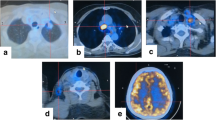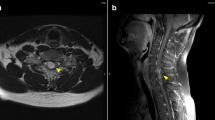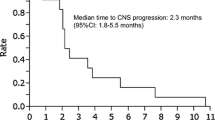Abstract
Acquired resistance to epidermal growth factor receptor tyrosine kinase inhibitors remains the main hurdle in treating EGFR-mutated lung cancer. Besides, when leptomeningeal carcinomatosis occurs during treatment, it often leads to treatment failure. We herein report a case of lung adenocarcinoma involving a patient with an EGFR exon 19 deletion mutation who developed leptomeningeal carcinomatosis after afatinib treatment for post-operative recurrence. He received right lower lobectomy, followed by four cycles of cisplatin and pemetrexed treatment. Follow-up CT/MRI revealed multiple pulmonary metastases and brain metastases at 7 months after surgery, and afatinib (40 mg/day) was administered after stereotactic radiotherapy for brain metastasis. At 28 months after surgery, follow-up MRI revealed asymptomatic leptomeningeal carcinomatosis, which was cytologically proven from the cerebrospinal fluid. Because EGFR T790M was not detected in plasma cell-free DNA or cerebrospinal fluid, erlotinib and bevacizumab combination treatment was administered. He remained asymptomatic and was radiographically clear of LM at 2 months after treatment. In comparison to other EGFR-TKIs, erlotinib shows penetrance into the cerebrospinal fluid. Furthermore, the addition of bevacizumab might enhance the treatment effect, because it is known to relieve brain edema from metastatic brain tumors by normalizing immature vascularity and improving drug penetrance into the cerebrospinal fluid by reducing interstitial fluid pressure.



Similar content being viewed by others
References
Yu HA, Arcila ME, Rekhtman N et al (2013) Analysis of tumor specimens at the time of acquired resistance to EGFR-TKI therapy in 155 patients with EGFR-mutant lung cancers. Clin Cancer Res 19:2240–2247
Goss G, Tsai CM, Shepherd FA et al (2016) Osimertinib for pretreated EGFR Thr790Met-positive advanced non-small-cell lung cancer (AURA2): a multicentre, open-label, single-arm, phase 2 study. Lancet Oncol 17:1643–1652
Li YS, Jiang BY, Yang JJ et al (2016) Leptomeningeal metastases in patients with NSCLC with EGFR mutations. J Thorac Oncol 11:1962–1969
Lee YJ, Choi HJ, Kim SK et al (2010) Frequent central nervous system failure after clinical benefit with epidermal growth factor receptor tyrosine kinase inhibitors in Korean patients with non-small-cell lung cancer. Cancer 116:1336–1343
Dickson PV, Hamner JB, Sims TL et al (2007) Bevacizumab-induced transient remodeling of the vasculature in neuroblastoma xenografts results in improved delivery and efficacy of systemically administered chemotherapy. Clin Cancer Res 13:3942–3950
Masuda T, Hattori N, Hamada A et al (2011) Erlotinib efficacy and cerebrospinal fluid concentration in patients with lung adenocarcinoma developing leptomeningeal metastases during gefitinib therapy. Cancer Chemother Pharmacol 67:1465–1469
Seto T, Kato T, Nishio M et al (2014) Erlotinib alone orwith bevacizumab as first-line therapy in patients with advancednon-squamous non-small-cell lung cancer harbouring EGFR mutations(JO25567): an open-label, randomised, multicentre, phase 2 study. Lancet Oncol 15:1236–1244
Gridelli C, Rossi A, Ciardiello F et al (2016) BEVERLY: rationale and design of a randomized open-label phase III trial comparing bevacizumab plus erlotinib versus erlotinib alone as first-line treatment of patients With EGFR-mutated advanced nonsquamous non-small-cell lung cancer. Clin Lung Cancer 17:461–465
Kato T, Seto T, Nishio M et al (2018) Erlotinib plus bevacizumab phase ll study in patients with advanced non-small-cell lung cancer (JO25567): updated safety results. Drug Saf 2:229–237
Sakata Y, Kawamura K, Shingu N et al (2016) Erlotinib plus bevacizumab as an effective treatment for leptomeningeal metastases from EGFR mutation-positive non-small cell lung cancer. Lung Cancer 99:120–122
Ariyasu R, Horiike A, Koyama J et al (2017) Efficacy of bevacizumab and erlotinib combination for leptomeningeal carcinomatosis after failure of erlotinib. Anticancer Drugs 28:565–567
Togashi Y, Masago K, Masuda S et al (2012) Cerebrospinal fluid concentration of gefitinib and erlotinib in patients with non-small cell lung cancer. Cancer Chemother Pharmacol 70:399–405
Naumov GN, Nilsson MB, Cascone T et al (2009) Combined vascular endothelial growth factor receptor and epidermal growth factor receptor (EGFR) blockade inhibits tumor growth in xenograft models of EGFR inhibitor resistance. Clin Cancer Res 15:3484–3494
Masuda C, Yanagisawa M, Yorozu K et al (2017) Bevacizumab counteracts VEGF-dependent resistance to erlotinib in an EGFR-mutated NSCLC xenograft model. Int J Oncol 51:425–434
Li H, Takayama K, Wang S et al (2014) Addition of bevacizumab enhances antitumor activity of erlotinib against non–small cell lung cancer xenografts depending on VEGF expression. Cancer Chemother Pharmacol 74:1297–1305
Herrlinger U, Wiendl H, Renninger M et al (2004) Vascular endothelial growth factor (VEGF) in leptomeningeal metastasis: diagnostic and prognostic value. Br J Cancer 91:219–224
Cheng H, Perez-Soler R (2018) Leptomeningeal metastases in non-small-cell lung cancer. Lancet Oncol 19:e43–e55
Author information
Authors and Affiliations
Corresponding author
Ethics declarations
Conflict of interest
The authors declare that they have no conflict of interest.
Informed consent
Informed consent was obtained from all individual participants included in the study.
Ethical approval
This article does not contain any studies with human participants or animals performed by any of the authors.
Additional information
Publisher’s Note
Springer Nature remains neutral with regard to jurisdictional claims in published maps and institutional affiliations.
About this article
Cite this article
Abe, M., Osoegawa, A., Karashima, T. et al. Erlotinib and bevacizumab combination therapy for afatinib-refractory leptomeningeal carcinomatosis from EGFR-mutated lung cancer. Int Canc Conf J 8, 81–85 (2019). https://doi.org/10.1007/s13691-019-00358-6
Received:
Accepted:
Published:
Issue Date:
DOI: https://doi.org/10.1007/s13691-019-00358-6




